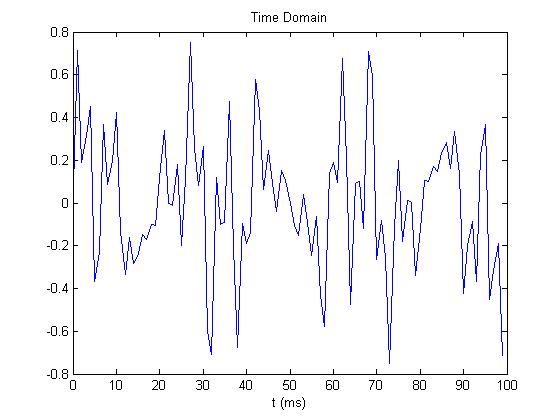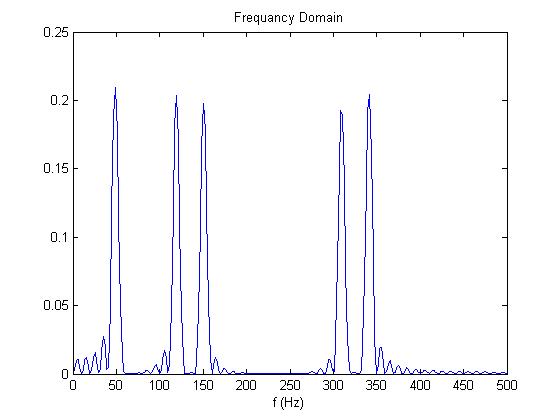Chris' Page for HW 4 (Fourier Transforms): Difference between revisions
No edit summary |
mNo edit summary |
||
| (4 intermediate revisions by the same user not shown) | |||
| Line 6: | Line 6: | ||
The Fourier Transform is detonated by; | The Fourier Transform is detonated by; | ||
:<math>X(f) = \int_{-\infty}^{\infty} x(t)\ e^{-j \omega t}\,dt, </math> | :<math>X(f) = \int_{-\infty}^{\infty} x(t)\ e^{-j \omega t}\,dt, </math> | ||
| Line 22: | Line 21: | ||
: <math>\mathcal{L}\left\{f(t)\right\} =\int_{-\infty}^{\infty} e^{-st} f(t)\,dt.</math> | : <math>\mathcal{L}\left\{f(t)\right\} =\int_{-\infty}^{\infty} e^{-st} f(t)\,dt.</math> | ||
Setting <math> s=j\omega</math> (<math>\sigma=0</math>) gives the equation | |||
: <math>\mathcal{L}\left\{f(t)\right\} =\int_{-\infty}^{\infty} e^{-j\omega t} f(t)\,dt.</math> | |||
which is identical to the Fourier Transform. The same relationship exists between the Inverse Laplace and the Inverse Fourier transforms. | |||
== Examples == | == Examples == | ||
Below is a very basic example based on a Matlab help file. | |||
The time domain signal is produced by | |||
<code> | |||
t = 0:0.001:.1; | |||
y = sin(2*pi*50*t)+sin(2*pi*120*t) +sin(2*pi*150*t) +sin(2*pi*310*t) +sin(2*pi*340*t); | |||
y = 0.2 .* y; | |||
</code> | |||
The t matrix represents time vectors and y is the summation of sine functions of various frequencies, then y is redefined as 1/5 the original power. | |||
Plotted with | |||
<code> | |||
figure(1) | |||
plot(1000*t(1:100),y(1:100)) | |||
title('Time Domain') | |||
xlabel('t (ms)') | |||
</code> | |||
yields | |||
[[Image:Example1time.jpg]] | |||
Then taking the Fourier Transform via the FFT and plotting | |||
<code> | |||
Y = fft(y,512); | |||
Power = Y .* conj(Y) / 512; | |||
f = 1000*(0:256)/512; | |||
figure(2) | |||
plot(f,Power(1:257)) | |||
title('Frequancy Domain') | |||
xlabel('f (Hz)') | |||
</code> | |||
[[Image:Example1freq.jpg]] | |||
And if you want to hear it | |||
<code> | |||
wavwrite(y,1000,16,'test2.wav') | |||
</code> | |||
then | |||
<code> | |||
clear all | |||
</code> | |||
I believe that windowing needs to be added. Suggestions? | |||
Latest revision as of 00:52, 4 November 2007
The Fourier Transform is a process or formula that converts a signal from one domain to another. Often it is used to go between the time domain and the frequency domain.
Developed by Frenchman, Jean Baptiste Joseph Fourier (1768 - 1830), the Fourier Transform stems from the more general Fourier Analysis, which is the representation of a function with sine and cosine terms. Unlike the Fourier Series the Fourier Transform is capable of representing aperiodic signals.
Mathematical Description
The Fourier Transform is detonated by;
The Inverse Fourier Transform is;
Relation to Laplace Transform
Unless otherwise noted, a Laplace Transform is defined by the unilateral or one-sided integral
The Laplace Transform can be applied from to , this is known as the Bilateral Laplace Transform and is denoted by
Setting () gives the equation
which is identical to the Fourier Transform. The same relationship exists between the Inverse Laplace and the Inverse Fourier transforms.
Examples
Below is a very basic example based on a Matlab help file.
The time domain signal is produced by
t = 0:0.001:.1;
y = sin(2*pi*50*t)+sin(2*pi*120*t) +sin(2*pi*150*t) +sin(2*pi*310*t) +sin(2*pi*340*t);
y = 0.2 .* y;
The t matrix represents time vectors and y is the summation of sine functions of various frequencies, then y is redefined as 1/5 the original power.
Plotted with
figure(1)
plot(1000*t(1:100),y(1:100))
title('Time Domain')
xlabel('t (ms)')
yields
Then taking the Fourier Transform via the FFT and plotting
Y = fft(y,512);
Power = Y .* conj(Y) / 512;
f = 1000*(0:256)/512;
figure(2)
plot(f,Power(1:257))
title('Frequancy Domain')
xlabel('f (Hz)')
And if you want to hear it
wavwrite(y,1000,16,'test2.wav')
then
clear all
I believe that windowing needs to be added. Suggestions?

